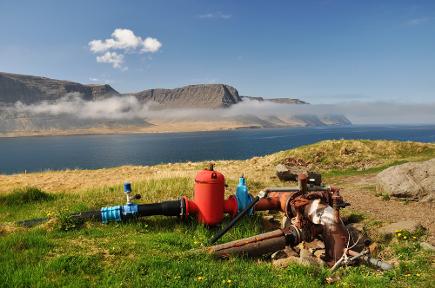Your home’s heating system is responsible for keeping your family comfortable all winter long. As we head into heating season, it’s important to know the type of equipment in your home, how it works, and its impact on your monthly energy usage. Knowing this information will make it easier when you need a repair or when it comes time to purchase a replacement.
Most homes in Maryland are heated by a boiler, furnace or heat pump. These systems operate differently but achieve the same goal – keeping your family toasty warm.
Boilers Boilers use fuel (gas, oil or propane) to create steam or hot water that circulates through a system of pipes in baseboard or radiators. There are several advantages to having a boiler, including quiet operation and low risk of breakdown. Plus, boilers are reliable and durable, resulting in a long service life. Most new homes are not equipped with boilers, since several more energy-efficient options are available. However, if your home has a boiler, there are new, high-efficiency systems available that can help reduce energy bills.
Furnaces Most homes in Maryland have a split system, meaning the air conditioner is located outside and the furnace is inside. A furnace operates using a fuel source, such as natural gas, propane, oil, or electricity, to generate warm air and distribute it throughout a home’s duct system. There are four primary components of a furnace: the burner, the heat exchanger, the blower and the flue. The burner uses the fuel to generate heat, which warms the heat exchanger. The blower then moves the heat through the duct system. Cool air is pulled into the system to be heated by the heat exchanger and redistributed throughout the house. Any combustion byproducts are exhausted outdoors through the flue. Modern furnaces are extremely efficient compared to older models, so replacing your furnace can be beneficial in helping reduce energy expenses.
Heat Pumps A heat pump is another common type of heating system for homes in Maryland. A heat pump is a split system unit that has an indoor air-handler and an outdoor unit that looks similar to an air conditioner. In heating mode, cool air is heated as it moves across the indoor coil and is distributed throughout the home. In cooling mode, warm air is cooled by the indoor coil and is distributed throughout the home. Most heat pump systems have a backup heat source such as electric, oil, or gas to supplement the heat pump when the outdoor temperatures are very cold. This system is ideal for homes where gas is unavailable or when electricity is the most cost-effective option. Because it has both heating and cooling functionalities, heat pumps can often be a very economical and energy-efficient option in climates that experience all seasons.
Your heating system keeps your home comfortable throughout the winter, but it also contributes the most to your monthly energy bills. Therefore, it’s helpful to know what type of heating equipment is in your home, how it works, and how its efficiency impacts your monthly energy consumption. Keep in mind that certain types of systems may be better suited to certain climates. Baltimore heating and air conditioning needs are vastly different than those in other areas of the country, so make sure you choose a unit that works well for your region. |
 Three Ways Geothermal Heat Pumps Benefit Homeowners
Geothermal heat pumps, also known as ground source heat pumps, are a type of central heating and cooling appliance that are recently growing in popularity. Since they use the earth as a natural source of heat, this type of heat pump is extremely efficient and can be made even more efficient when combined with solar heating. There are a few reasons that geothermal heat pumps have been becoming more popular in homes in the United States as of late. Homeowners are realizing that the secret to cutting back on energy bills is simply switching to geothermal! A More Comfortable Home When it comes to creating a more comfortable home environment, geothermal heat pumps outshine traditional AC units. Unlike with standard appliances, geothermal pumps distribute warm and cool air evenly throughout the home with the use of a precise distribution system. While you may have once battled with some rooms being much warmer than others, this alternative eliminates that issue. They also operate much more quietly than central air units. Finally, since these units are housed indoors, they withstand less wear and tear and, therefore, require fewer repairs. Efficiency and Savings By making the switch to a geothermal heat pump, you'll see your energy bills reduced by up to 70%. Along with your lower energy costs, you'll notice that you're spending less money per year on repairs since they're much more reliable. In fact, they're one of the most cost-effective heating and cooling options currently on the market. Going Green Many homeowners today are concerned with the size of their carbon footprints. We all take measures to reduce the amount of energy we consume and waste we produce, whether it's a small change like buying eco-friendly light bulbs, or a larger change like installing solar panels. If this is a concern in your home – and in this day and age, it should be – you'll be pleased to know that these pumps are one of the most environmentally-friendly options out there. According to the EPA, they're "the most energy-efficient, environmentally clean, and cost-effective space conditioning systems available today." Who wouldn't want to cut back significantly on their energy bills? Combine that with the fact that your home will be more consistently comfortable, and you get the peace of mind of knowing you're doing your part to help the Earth, and geothermal heat pumps start to look like a very attractive option. As long as you have the help of a knowledgeable representative when buying and installing your unit, you'll never look back. |